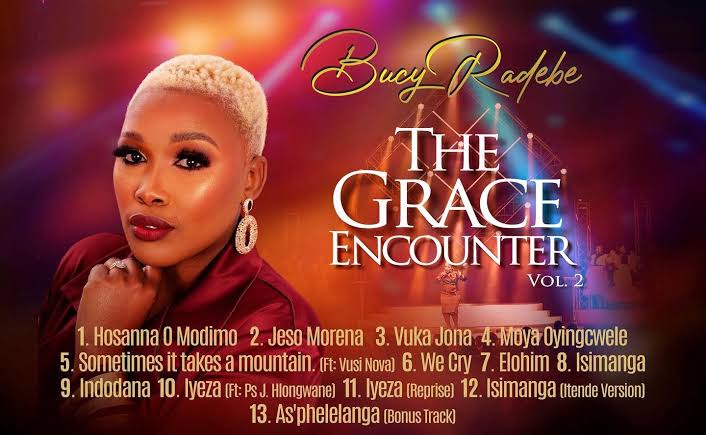The Grace Encounter Vol. 2 may not strike a chord immediately, but listening from the place of appreciation will definitely immerse listeners into its depth…
By John Augustina
It goes without saying that Gospel artistes such as the award-winning South African singer, Phumulani Asnath Radebe, popularly known as Brucy Radebe, have massively contributed to the flow of inspirational songs in Gospel music in Africa. Radebe’s journey as a Gospel artiste has been laurelled with significant acceptance ever since she was thrust into limelight by her hit song “Uzugcin’ Impilo Yam,” in 2019.
In 2022, Radebe released a most spectacular album titled, The Grace Encounter Vol 1. The album did well, and many people snuggled into the depth of its songs. Making a grand entry into 2023, Radebe has released The Grace Encounter Vol 2, a sequel to the last album. The album hosts 13 tracks and has been embraced by many since its release.
Radebe released her debut album, Spiritual Encounter, in 2020. Barely two years after its release, it reached over 32 million streams and 23 million views on YouTube. It does appear that Radebe’s musical career has been a parallel success. She has several awards crested on her collar. Significant are the South African Music awards, Crown Gospel Music awards, and Ingomas award.
Music has always been a delicate part of South Africa’s culture. This validates the energy and passion that they push into their singing. Hardly is there a South African song that does not stir the heart. Radebe’s singing is marinated in Zulu slurs and styling. She delivers her songs with so much energy that you may think her vocal cords are about to shred.
The songs on The Grace Encounter Vol. 2 album translate approximately to songs of thanksgiving and a heart yearning for an experience with God. The album features varieties of genres, from Reggae to Jazz, Country music to Afrobeats, Blues to Jazz, and everything in between.
I have listened to a handful of Gospel renditions done in languages I didn’t understand, yet, I could connect with them. This album, however, stands tall. I must say that the album produced a more in-depth experience in me. It comes with an overwhelming tide of depth with its provocative rhythms and persuasive sounds. The Grace Encounter Vol. 2 recounts the message of God’s love, worship, and fellowship with God.
The album opens with “Hosanna O Modimo.” The track is embellished with synths, wild lead percussion, and thick bass lines that set the tone throughout the track. Radebe jumps on the track in full evangelistic mode, declaring the praises and greatness of God, in a rather short-lived but worthy moment of exhortation. “Hosanna O Modimo” translates to “Hosanna you are the supreme being” in Zulu. The song, a praise rendition, captures God as the greatest. This track comes with the usual South African improvisation of new rhythmic lines by the lead singer, while backup singers sing a chorus repeatedly.
(Read also : Enkay Ogboruche’s Declaration Album wields the Sceptre of Praise)

With a soft blend of linear guitar progression and piano chords, “Moya Oyingcwele,” Zulu for “come, Holy spirit” comes up on the album. Every line flowed with deep emotion and a convincing thirst for a touch from God. Each landing note houses a beautiful display of Radebe’s vocal strength in the most alluring manner. Here, Radebe sings of her desire to receive a touch from God.
“Jeso Morena,” Zulu for “Jesus is King,” speaks of God’s greatness. Like every other praise song on this album, this is clothed with immense adoration and appreciation of God’s strength and ability. This song comes with a strong mix of Reggae and Afrobeats.
Next on the album is “Sometimes it Takes a Mountain,” the first of the three English renditions on the album. The track starts with a Country intro and later fades into an overlap of Blues as Radebe sings the first verse. The song is a soulful outflow that speaks of how an unfavourable situation can draw a believer closer to God. The song is gloved with vulnerable lyrics that are relatable to every Christian, judging from the fact that life throws lemons at everyone.
“We Cry Aloud” is cradled by distinct harmonies. The song’s lush arrangement intensifies as the song progresses, with a palpable pull toward fervent prayers and a desire for an encounter with God. Here, Radebe employs a meditative caesura that allows the listeners a moment of reminiscence before moving on to the next line. “We Cry Aloud’ is a song of extreme desire for an outpouring from God.
“Elohim” starts with spontaneous piano scales as Radebe passionately adores God and convincingly declares God as her all in all. Radebe ad-libs the song with different lines as the backup singers continuously repeat the chorus that says “sweetest to my soul, Jesus my all in all,” creating a polyphonic effect.
“Isimanga” is decorated with contagious emotions that come from the deepest part of Radebe’s soul. This track clearly shows that feelings are better communicated in songs. The song kick-starts with Radebe telling poignant stories of her mother’s ailment and all the struggles she encountered while putting the album together. The moment gravitated into Radebe echoing the first line of the song. On a mid-tempo instrumental, Radebe solemnly sings about the faithfulness of God through the hard times she has faced. This song encourages believers to trust in the unfettered nature of God’s love.
With elements of Jazz, “Vuka Jona” starts with the swirling sound of guitars cemented on subtle piano chords and mid-tempo drum kicks. In this song, Radebe encourages believers to wake up and embrace the call of God.
Dipped in Reggae and Afrobeats, a remix of “Isimanga” appears on the album. Fitted on mildly throbbing hits on the snare drum, linear piano progression, with dense bass lines drenched in staccatos, Radebe retells the story of God’s faithfulness.
With lyrics hovering like a thick cloud over a chirpy instrumental, Radebe declares God as the healer in “Iyeza.” Accompanied by rich slurs and riffs, Radebe invitingly delivers the lyrics that speak of God’s healing and his ability to make people whole.
“Indodana” is a song of thanksgiving to God for his son, Jesus. The beginning finds Radebe cheering the audience into making joyful noises with the usual palatal clicks associated with the Zulu language. I enjoyed the perceptible excitement with which Radebe delivers this song.
(Read also: Moses Bliss’ More than Music album showcases his Skill in Full Gear)
In “Iyeza,” the instrumental, soiled with elements of Jazz music, effortlessly navigates upward, slightly changing the beat from when it first appeared on the album. Here, Radebe alongside, South African Gospel singer, Jabu Hlongwane, magnifies God’s name.
Last on the album is “As’phelelanga.” This is a Zulu rendition that means “we are not all here, we are incomplete.” This song sends the message of the hope believers have of another life with God.
In The Grace Encounter Vol. 2 there was an obvious lapse in the instrumental that accompanied “We Cry Aloud.” Radebe’s notes were not in sync with the piano progression. As spontaneous as the song was, not every line was improvised on stage. The pianist seemed unsure about what Radebe’s next note would be, and the minors she incorporated were not effectively backed up with corresponding notes.
Also, in a society where people find songs done in English more appealing and easier to understand, it makes it hard for them to enjoy songs that are sung predominantly in a language that they do not know.
Being a music critic has exposed me to many Gospel albums that are predominantly sung in African languages, and I can assure you that listening to them or sourcing for the interpretation of the lyrics never come easy. It can be really distracting, to say the least. It can go a long way to affect the receptivity of an audience who are oblivious of a language. I’m aware of the disparities that exist in the opinions people share in judging a Gospel song. However, Gospel songs are regarded as inspirational when more people can relate with the lyrics. The place of good production can never be downplayed in the production of Gospel songs, but as good as that is, and the beauty it adds to songs, it doesn’t rank higher than the message. Music needs to be adequately interpreted by a singer to drive communication. It is in this that songs breathe life to listeners. It is also in this that the album falters.
(Read also: Dunsin Oyekan’s The Birth of Revival is a Meal Well Served)

At first, the songs on this album were not the most inviting of songs for me. I reluctantly walked myself through the first song upon discovering it was in Zulu. The patience I showed in listening to the song eventually paid off. I had to intentionally deconstruct my mind from interfering with the beauty of the songs, and I advise every listener to do the same.
Still, the songs on The Grace Encounter Vol. 2 are too good to be confined to natives or speakers of the Zulu language. While I understand songs written in indigenous languages exist, English is weaved in, just to offer a glimpse into what is being said. The Grace Encounter Vol. 2 eschewed from doing any of that in ten songs on the album. Ten out of the thirteen songs are done entirely in Zulu. There should have been space for more linguistic inclusivity. This presents what could be seen as a failing of the project.
I must reiterate that listening to an album whose songs are mostly sung in unfamiliar languages can be exhausting. Regardless, such songs exist and are enjoyed by many who make a conscious decision to love them. Such songs, especially in bodies of work like The Grace Encounter Vol. 2, may not strike a chord immediately, but listening from the place of appreciation will definitely immerse listeners into its depth.
Lyricism – 2
Vocal production – 1
Sound Production – 1
Beat – 1
Tracklisting – 1
Rating – 6/10
John Augustina is a writer, a journalist, a singer, loves people and currently writes for Afrocritik. You can connect with her on Facebook @John Tina and Instagram @johntina_tina



